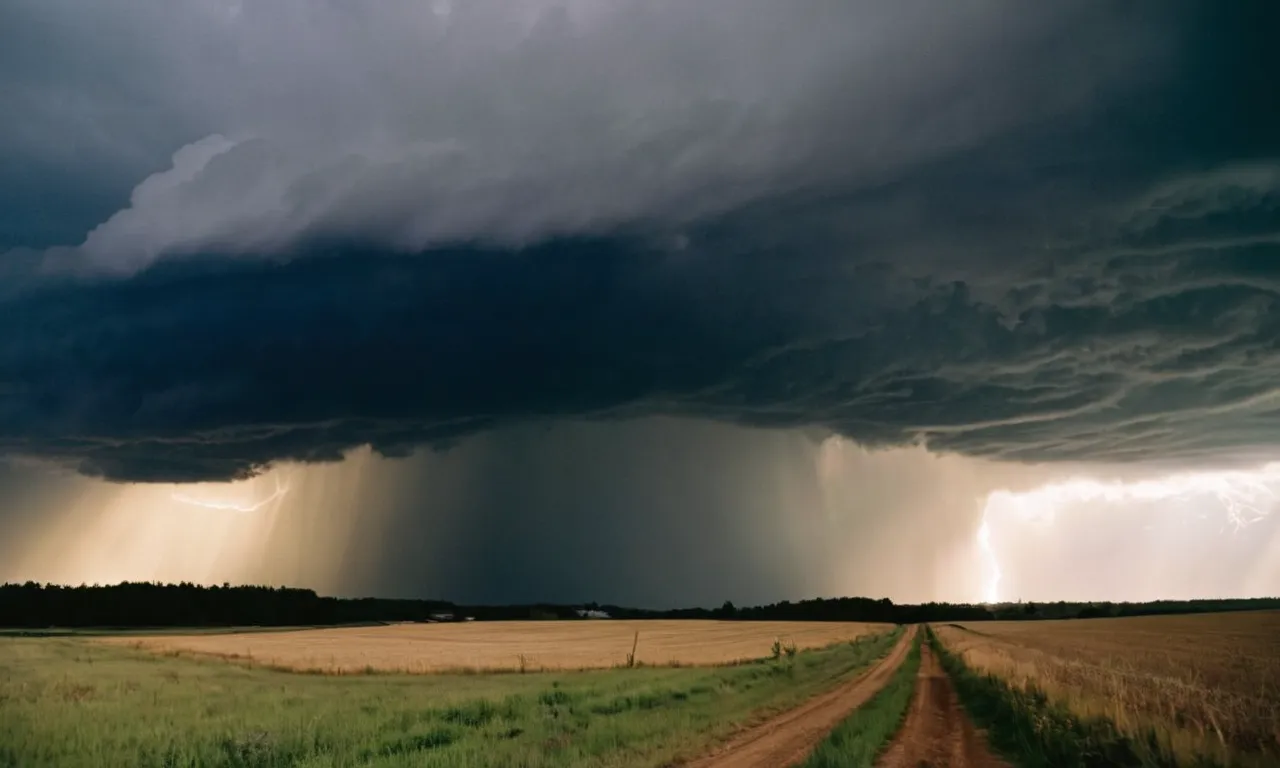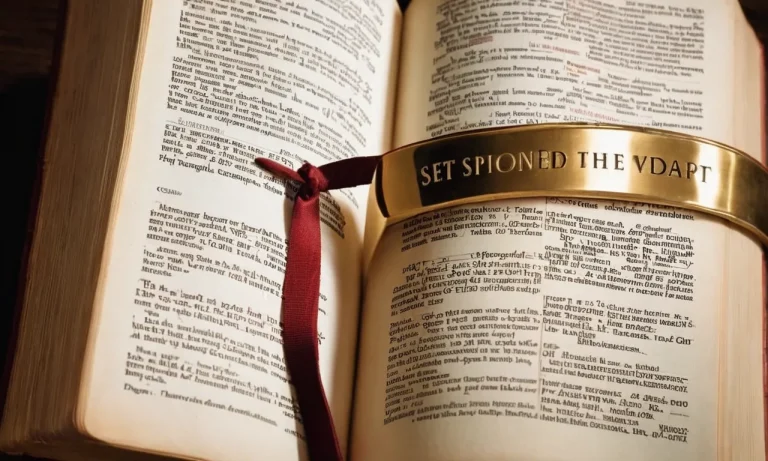What Does The Bible Say About Storms And Hurricanes?
Storms and hurricanes can be frightening and devastating natural disasters. As people of faith, we may wonder what the Bible has to say about these powerful forces of nature. If you’re short on time, here’s a quick answer to your question: The Bible recognizes storms and destructive natural events as part of God’s creation and under His sovereign control.
At times, storms are seen as judgments from God or symbols of coming judgment, but the Bible also offers hope and comfort for those enduring storms.
In this detailed article, we will explore the scriptural foundations for understanding storms and hurricanes. We will look at relevant passages from the Old and New Testaments, analyzing what these verses tell us about God’s purpose in storms, how we should respond to them, and the assurance we have in the midst of tumultuous circumstances.
God’s Sovereign Power Over the Storms
Storms are under God’s command and serve His purposes
The Bible clearly teaches that God is sovereign over all of nature, including storms like hurricanes. In Psalm 107:25, the psalmist describes a storm at sea and says “For he spoke, and stirred up a tempest that lifted high the waves.”
This shows that the storm arose at God’s command to fulfill His purposes.
Similarly, in Mark 4:39, Jesus rebuked the wind and waves during a severe storm, saying “Peace! Be still!” And the storm immediately ceased. This demonstrates Jesus’ divine power and authority over the forces of nature and weather.
God often uses storms and natural disasters to get people’s attention or to punish sin and rebellion against Him (Amos 4:6-12). But He also uses storms and trials to strengthen our faith and teach us perseverance (Romans 5:3-5).
God controls wind, rain, floods, and every aspect of storms
The Bible teaches that God is the one who causes rain and droughts (Jeremiah 5:24), who controls the wind (Psalm 148:8), and even stores up hail, snow, thunder and lightning for His purposes (Job 38:22-23).
Scripture says “The LORD sits enthroned over the flood” (Psalm 29:10) – indicating His sovereign rule over even cataclysmic storms and floods.
In Job 37, Elihu extols the wondrous works of God in nature, saying that God controls winter storms, rain, clouds, lightning and thunder. He says God “does great things beyond our understanding” (v5) in how He commands and controls the weather.
A well-known example is when Jesus calmed the storm on the Sea of Galilee, demonstrating His divine power over wind and waves (Mark 4:35-41). The disciples were terrified, but Christ spoke and the chaotic forces of nature obeyed His voice instantly.
Storms show that God is mightier than nature’s destructive forces
Fierce storms often feel random, chaotic and out of control. But God is mightier than any hurricane or tornado. As Jeremiah 10:13 declares, “When He utters His voice, there is a multitude of waters in the heavens: And He causes the vapors to ascend from the ends of the earth.
He makes lightning for the rain, He brings the wind out of His storehouses.”
God has complete authority over storms, using lightning, wind, rain and floods to show His supremacy over nature. Storms remind us that we are not sovereign – God is. Storms humble human pride and powerlessness in the face of something greater than us.
Ultimately storms call us to trust God’s power and mercy to bring good from tragedy. As John Piper notes, “Floods…have a way of taking our lives and plans into their control…That’s why floods have such spiritual and psychological impact on us.” But we can take refuge in God who rules the storm.
Storms as Judgments or Symbols of God’s Wrath
The Flood was God’s judgment on human wickedness
The Genesis flood narrative describes a catastrophic global flood sent by God to destroy the wickedness of humanity. Only Noah and his family were righteous enough to be saved, by building the ark as God instructed (Genesis 6-9).
This stormy flood was God’s dramatic judgment on the rampant immorality and violence that had corrupted mankind.
Plagues of hail, storms, and floods on Egypt
In the book of Exodus, God sends a series of intense plagues upon Egypt to free the Israelite slaves. These included devastating hailstorms that destroyed crops (Exodus 9:13-35), and violent thunder and hail to show God’s might (Exodus 9:22-26).
The plagues culminated in the Red Sea being parted to let the Israelites escape, then closing back upon the Egyptian army, drowning them (Exodus 14). These stormy plagues and floods symbolized God’s judgment on the Egyptians’ oppression and stubbornness.
Storms as symbols of coming judgment or divine wrath
Storms are frequently used as symbols of God’s wrath and coming judgment in Scripture. For example, Nahum 1:3 says: “The Lord is slow to anger but great in power; the Lord will not leave the guilty unpunished. His way is in the whirlwind and the storm, and clouds are the dust of his feet.”
Storm imagery often accompanies prophecies of God’s judgment on nations or individuals’ sin, indicating the intensity of His righteous anger (Psalm 83:15, Ezekiel 13:11-13). But God also promises that those who trust in Him will be secure amid the storms, as a shelter from the wind and rain (Isaiah 25:4).
Finding Comfort and Hope in God During Storms
God protects and strengthens those who trust in Him
The Bible reminds us that God is our rock and fortress during the storms of life (Psalm 18:2). He is described as a shelter from the storm and shade from the heat (Isaiah 25:4). When we keep our eyes fixed on Him, He will give us strength and courage to endure the trials we face (Isaiah 40:31).
We can be confident that He will never leave us or forsake us, no matter what storms come our way (Hebrews 13:5).
Here are some powerful promises from Scripture to meditate on when going through difficult storms:
- “The Lord will rescue me from every evil attack and will bring me safely to his heavenly kingdom.” (2 Timothy 4:18)
- “Even though I walk through the darkest valley, I will fear no evil, for you are with me; your rod and your staff, they comfort me.” (Psalm 23:4)
- “When you pass through the waters, I will be with you; and when you pass through the rivers, they will not sweep over you. When you walk through the fire, you will not be burned.” (Isaiah 43:2)
As we fix our eyes on Jesus, the perfecter of our faith, we can be assured that He will give us His peace and strength to weather any storm that comes our way. We are safe in His hands.
Prayers for deliverance from storms
Bringing our requests to God in prayer is one of the most powerful ways to find comfort during storms and trials. Praying allows us to cast our anxieties on the Lord because He cares for us (1 Peter 5:7).
Here are some prayers we can pray directly from Scripture when going through difficult storms in life:
- “Lord, do not hide your face from me in my time of distress. Turn your ear to me and answer me quickly when I call.” (Psalm 102:2)
- “God is our refuge and strength, an ever-present help in trouble. Therefore we will not fear.” (Psalm 46:1-2)
- “Lord, you are the Almighty Creator of heaven and earth. Nothing is too difficult for you. I pray that you would calm this storm and grant me your perfect peace.” (Jeremiah 32:17)
We can have confidence knowing that God hears our prayers and promises to be with us and deliver us (Psalm 34:17, Psalm 91:15). He may not take away the storm, but He will walk with us through it.
God’s presence brings peace in life’s storms
Even when the storms of life are raging all around us, God promises a supernatural peace for those who keep their mind fixed on Him (Isaiah 26:3-4). His perfect love casts out all fear (1 John 4:18). We can experience joy in the midst of trials as we focus on the hope we have in Christ (Romans 15:13).
Here are some key truths to remember about God’s peace in the storms:
- Jesus said “I have told you these things so that in me you may have peace. In this world you will have trouble. But take heart! I have overcome the world.” (John 16:33)
- We have access to God’s peace that transcends human understanding through prayer (Philippians 4:6-7)
- The Holy Spirit produces supernatural joy, peace and comfort in the midst of trials (Romans 14:17, Acts 9:31)
As we walk closely with God through prayer and Scripture meditation, He will guard our hearts with His perfect peace (Philippians 4:7). We never have to walk through the storms alone.
Promises of God’s faithfulness and restoration after the storm
Not only does God promises to be with us in the midst of the storms, but He also assures us of His great faithfulness to restore and bless us after the season of difficulty passes. Here are some promises of hope and restoration to claim after the storm:
- “Weeping may last through the night, but joy comes with the morning.” (Psalms 30:5)
- “The Lord will guide you continually, giving you water when you are dry and restoring your strength.” (Isaiah 58:11)
- “God causes everything to work together for the good of those who love God and are called according to his purpose.” (Romans 8:28)
We can have confidence that God will redeem every hardship and trial for His glory and our good. He promises to repay and restore all that the enemy tries to steal from us (Job 42:10). Our role is to trust Him one day at a time, through each storm.
Responding to Storms with Wisdom, Faith and Compassion
Taking prudent precautions
When a hurricane or other major storm is forecasted to impact an area, it is wise to take reasonable precautions to protect life and property. This may include evacuating if advised, securing loose outdoor objects, stocking up on emergency supplies, and preparing for potential power outages.
However, we should avoid panicking or overreacting. With advanced weather tracking and early warning systems, people now have time to make prudent preparations before a storm arrives.
The Bible advises being wise and preparing for challenging times. In the words of Proverbs 22:3, “The prudent see danger and take refuge, but the simple keep going and pay the penalty.” Preparing for storms demonstrates both wisdom and faith – wisdom in taking sensible precautions, and faith that God will help see us through the storm’s impacts.
Expressing lament but avoiding despair
When storms bring devastating impacts like loss of life, injuries, and destruction of property, it is understandable to grieve and lament. The Bible contains many examples of crying out to God in times of trouble and pain.
However, as followers of Christ, we are called to face hardship with resilient faith rather than spiraling into despair. Though storms may prompt overwhelming emotions, we can anchor our hearts in the hope found in Christ.
The Psalms are full of examples of both lament and hope during trials. Psalm 18:16-19 depicts the psalmist crying out to God amid “torrents of destruction” but concludes in verse 19, “He brought me out into a spacious place; he rescued me because he delighted in me.
“ This illustrates moving from despair to renewed faith and trust in God’s deliverance.
Serving others impacted by storms
Just as Jesus demonstrated compassion during his earthly ministry by feeding the hungry and caring for the vulnerable, Christians are called to serve those in need, especially during disasters like hurricanes.
Whether through financial donations, volunteering, or providingshelter, believers can make a meaningful impact.
Hebrews 6:10 encourages, “God is not unjust; he will not forget your work and the love you have shown him as you have helped his people and continue to help them. “ When we serve “the least of these” who are suffering due to storms, we are ministering to Jesus himself (Matthew 25:45).
Storm relief efforts by churches and faith-based organizations provide a powerful witness of Christ’s love in action.
Conclusion
Storms are a complex matter when viewed through a biblical lens. On one hand, they demonstrate God’s awesome power and can function as judgments on human sinfulness. Yet, on the other hand, storms also allow us to see God’s mercy in protecting and restoring those who trust in Him.
By responding in faith, we can be comforted in God’s presence in life’s fiercest storms. This biblical perspective allows us to face hurricanes and tornados with reverent realism mixed with resilient hope.








